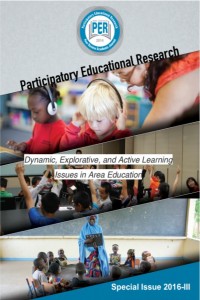Abstract
References
- Beerenwinkel, A., & Arx, M. v. (2016). Constructivism in Practice: an Exploratory Study of Teaching Patterns and Student Motivation in Physics Classrooms in Finland, Germany and Switzerland. Research in Science Education. doi:10.1007/s11165-015-9497-3
- Campbell, R., Kyriakides, L., Muijs, R., & Robinson, W. (2003). Differential teacher effectiveness: towards a model for research and teacher appraisal. Oxford Review of Education, 29(3), 347-362.
- Cohen, L., Manion, L., & Morrison, K. (2007). Research Methods in Education (6. b.). London: Routledge.
- Gijbels, D., Watering, G. V., Dochy, F., & Bossche, P. V. (2006). New learning environments and constructivism: The students’ perspective. Instructional Science, 34, 213-226. doi:10.1007/s11251-005-3347-z Karagiorgi, Y., & Symeou, L. (2005). Translating constructivism into instructional design: potential and limitations. Educational Technology & Society, 8(1), 17-27.
- Kroesbergen, E. H., & Luit, J. E. (2005). Constructivist mathematics education for students with mild mental retardation. European Journal of Special Needs Education, 20(1), 107- 116. doi:10.1080/0885625042000319115
- Matthews, W. J. (2003). Constructivism in the Classroom: Epistemology, History, and Empirical Evidence. Teacher Education Quarterly, 51-64.
- Miles, M., & Huberman, A. (1994). Qualitative Data Analysis (2. b.). Thousand Oaks, CA: Sage Publications.
- Schmidt, H. G., Molen, H. T., Winkel, W. W., & Wijnen, W. H. (2009). Constructivist, problem-based learning does work: a meta-analysis of curricular comparisons ınvolving a single medical school. Educational Psychologist, 44(4), 227-249. doi:10.1080/00461520903213592
- Smeda, N. (2014). Creating Constructivist Learning Environments with Digital Storytelling (PhD. Dissertation). Victoria University.
- Yıldırım, A., & Şimşek, H. (2005). Sosyal Bilimlerde Nitel Araştırma Yöntemleri (Extended 5th ed.). Ankara: Seçkin Yayıncılık.
Abstract
The aim of this study is to provide some findings about inclinations, number of studies,
study, data analysis, sampling methods and so on, and to summarize the results of the
studies: i) which were published between 2005 when new curricula were introduced and
2016 (until March when data collection was done); ii) were published in a journal
indexed in Turkish National Academic Network and Information Center (Ulakbim); iii)
that consist one of the following keywords in its title: “constructivism”, “constructivist
learning/teaching”, “constructive approach”, and iv) that employed experimental
method. This study employs the descriptive method which aims to represent a situation
as it is, and documentary analysis will be used as data analysis method. A total of 37
studies that employed the experimental method were published between 2006 and 2016
with one of the keywords in its title and could be reached in a journal indexed in
Ulakbim. They will be used as the data source. These studies will be examined on many
different aspects in order to find out inclinations and changes about constructive
learning and teaching experiences and understand how effective they have been. The
year with the most number of studies is 2009 with 6 studies and there are 5 studies in
both 2011 and 2012. The samples used in these studies are from all grade levels. Studies
examine the impact of some teaching and learning theories and methods that are used in
constructive approach and compare them with traditional teaching applications,
especially through pre and post-test experimental design with a control group.
Keywords
References
- Beerenwinkel, A., & Arx, M. v. (2016). Constructivism in Practice: an Exploratory Study of Teaching Patterns and Student Motivation in Physics Classrooms in Finland, Germany and Switzerland. Research in Science Education. doi:10.1007/s11165-015-9497-3
- Campbell, R., Kyriakides, L., Muijs, R., & Robinson, W. (2003). Differential teacher effectiveness: towards a model for research and teacher appraisal. Oxford Review of Education, 29(3), 347-362.
- Cohen, L., Manion, L., & Morrison, K. (2007). Research Methods in Education (6. b.). London: Routledge.
- Gijbels, D., Watering, G. V., Dochy, F., & Bossche, P. V. (2006). New learning environments and constructivism: The students’ perspective. Instructional Science, 34, 213-226. doi:10.1007/s11251-005-3347-z Karagiorgi, Y., & Symeou, L. (2005). Translating constructivism into instructional design: potential and limitations. Educational Technology & Society, 8(1), 17-27.
- Kroesbergen, E. H., & Luit, J. E. (2005). Constructivist mathematics education for students with mild mental retardation. European Journal of Special Needs Education, 20(1), 107- 116. doi:10.1080/0885625042000319115
- Matthews, W. J. (2003). Constructivism in the Classroom: Epistemology, History, and Empirical Evidence. Teacher Education Quarterly, 51-64.
- Miles, M., & Huberman, A. (1994). Qualitative Data Analysis (2. b.). Thousand Oaks, CA: Sage Publications.
- Schmidt, H. G., Molen, H. T., Winkel, W. W., & Wijnen, W. H. (2009). Constructivist, problem-based learning does work: a meta-analysis of curricular comparisons ınvolving a single medical school. Educational Psychologist, 44(4), 227-249. doi:10.1080/00461520903213592
- Smeda, N. (2014). Creating Constructivist Learning Environments with Digital Storytelling (PhD. Dissertation). Victoria University.
- Yıldırım, A., & Şimşek, H. (2005). Sosyal Bilimlerde Nitel Araştırma Yöntemleri (Extended 5th ed.). Ankara: Seçkin Yayıncılık.
Details
| Primary Language | English |
|---|---|
| Subjects | Studies on Education |
| Journal Section | Research Articles |
| Authors | |
| Publication Date | June 1, 2016 |
| Acceptance Date | November 30, 2016 |
| Published in Issue | Year 2017 Volume: 4 Issue: 1 |


